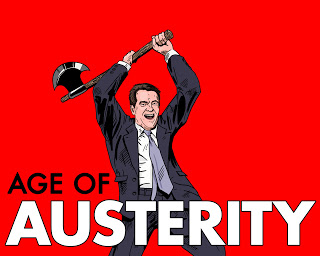 |
| George Osborne Image |
Dylan Ratigan
Huffington Post
Osama Bin Laden’s death cast the fear in our politics into stark relief. One of the weirdest cultural reactions after the announcement of his killing was how the Miley Cyrus song “Party in the U.S.A” got a renewed lease on life on Youtube. That song became the unofficial anthem marking the moment. I thought at the time that the partying was mindless cheering, a sports-like spectacle over something somber and important. Yet, while I think it’s generally awful to glorify killing, even in righteousness, with some more time to reflect I’ve changed my mind.
For over a decade, we’ve been running our politics on fear so often that it’s hardly noticeable. Take the debt ceiling kabuki — catastrophic economic consequences if we don’t raise the ceiling, the end of America if we don’t cut entitlements. This kind of fear-mongering is exactly how the banks justify any and everything to bail them out. And it’s disguising the actual problems we have as a nation, the six industries strangling our freedom: health care, banking, agribusiness, defense, energy, and telecom.
The people who made “Party in the U.S.A” a hit song, twice, are mostly kids who have known nothing but a fear-based dialogue from leaders that ignore their lives and their real problems in favor of slogans about the global war on terror. There are ten-year-olds who have never lived in an America at peace, and 18-year-old soldiers that barely remember when we weren’t trying to occupy Afghanistan. This is a generation that grew up on fear, and fear is very powerful.
linkwithin_text=’Related Articles:’

Be the first to comment on "Debt Ceiling Politics: Fearocracy or Democracy?"